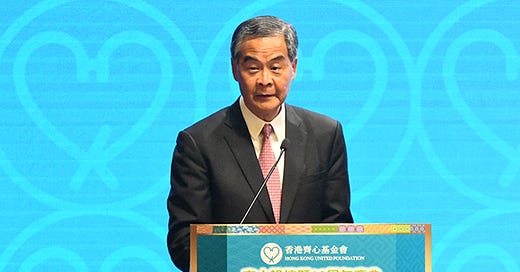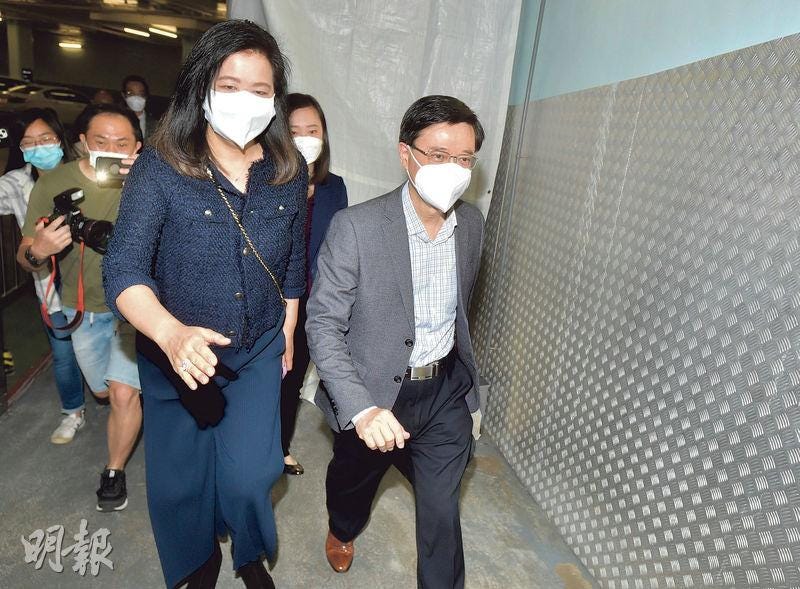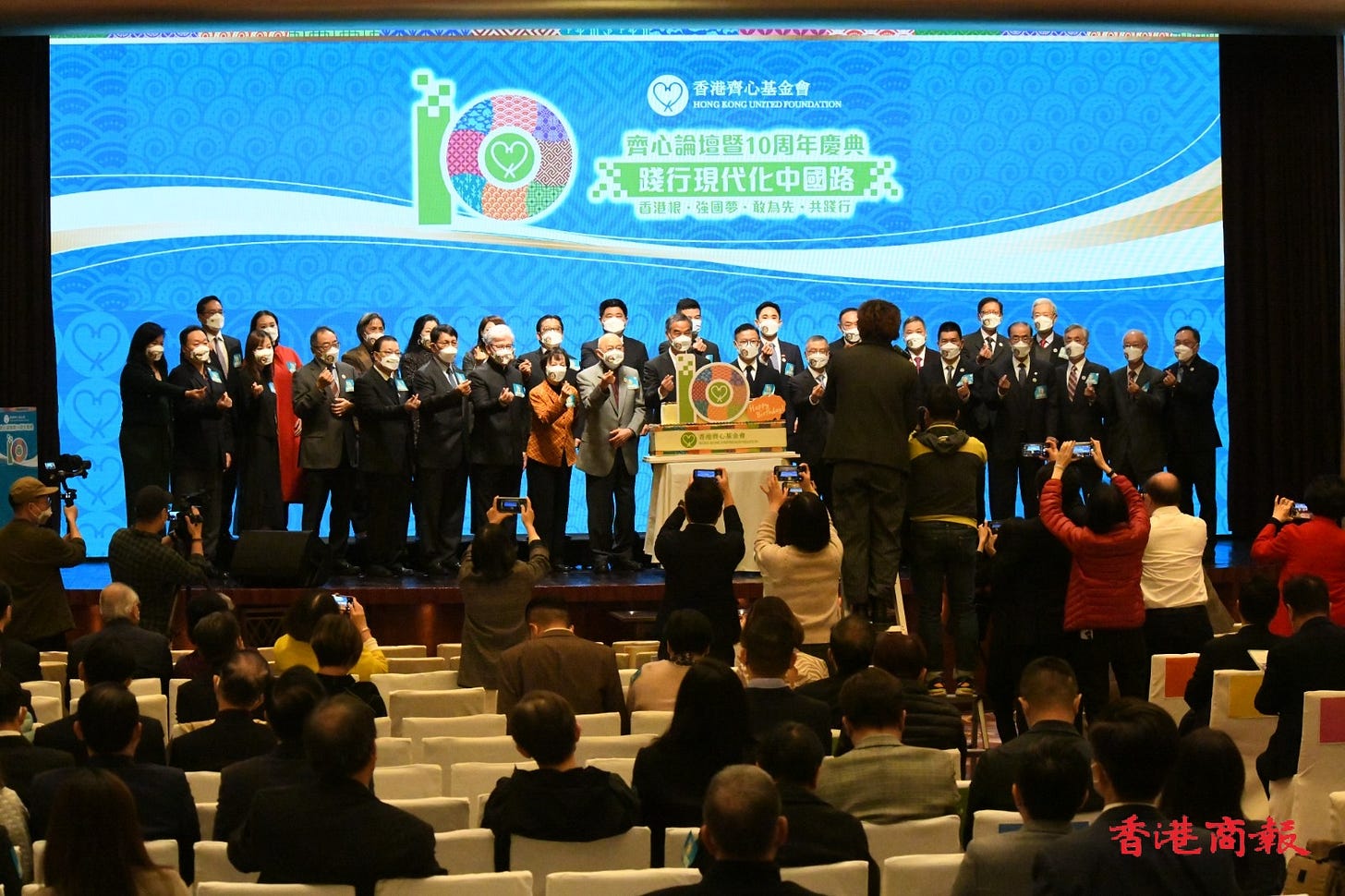Media in Focus: Hong Kong’s Positive Feedback Looop
Founded and run by close allies of former Hong Kong leader Leung Chun-ying, Looop Media’s outlets are the city's least trusted news sites. A decade later, how is it still growing?
This is the first piece in a new series from Lingua Sinica. We look closer at one particular Chinese-language news outlet or media group, asking — and answering — who they are, what they do, and why. Look out for more Media in Focus investigations in the future.
Speak Out HK (港人講地) and its parent organization Looop Media (圈媒體) are far from Hong Kong’s best-known media groups. But the online news outfit does enjoy one superlative: in 2019, in its first and only appearance in an annual survey on media reliability by the Chinese University of Hong Kong, Speak Out HK was ranked as the least-trusted news site in the whole territory. Across all mediums including print, radio, and television, its poor reputation was surpassed only by the state-run newspapers Ta Kung Pao (大公報) and Wen Wei Po (文匯報).
For a news source struggling to find a foothold in a competitive and oversaturated market, this may have been a death knell for their prospects — but Speak Out HK was never strictly founded as a news source to begin with. Soon after it got off the ground in 2013, it was already being described as the “propaganda department” of Leung Chun-ying (梁振英), who served as Chief Executive of Hong Kong from 2012-2017 and was subsequently appointed vice-chairman of the National Committee of the Chinese People's Political Consultative Conference.
In the years since, the Looop stable has only grown, adding outlets in new mediums, languages, and social media platforms. Their unlikely success tells us as much about the “new era” for media in Hong Kong as does the demise of so many of its erstwhile competitors.
Leung and Co.
It’s not difficult to see why. Speak Out HK was founded and run by the Hong Kong United Foundation (香港齊心基金會), a non-government organization expressly created to back Leung’s run for the chief executiveship. At its outset, the central figure in the Speak Out HK newsroom — which is to say the HKUF office — was Barry Cheung (張震遠), an early backer of Leung Chun-ying when he declared his candidacy for the top job. Cheung chaired Leung's election campaign office, became an Executive Councillor in Leung’s first administration, and had his term as chairman of the Urban Renewal Authority extended beyond the conventional six-year limit in 2013 — something that the opposition Civic Party, which has since been dissolved amidst the national security crackdown, alleged was a political reward.
Cheung later lost his board position when he was embroiled in a criminal misconduct case over unpaid wages and declared bankruptcy. But his story, from Leung loyalist to leader at Speak Out HK and HKUF, was not the exception — it was the rule.
Fellow co-founder Raymond Tang Yee Bong (鄧爾邦) was also an adviser to Leung during his campaign for Government House. Chan Ka Kui (陳家駒), Cheung’s replacement at HKUF following his fall from grace, was described by the pro-Beijing press as a “deep Leung” supporter. During Leung’s term as Chief Executive, a position that also made him the Chancellor of all Hong Kong universities, Chan was appointed to the board of City University. Then there’s Looop director and HKUF executive chairman Thomas Tang Koon Yiu (鄧觀瑤), with whom Leung shares an extra-special relationship. As well as working together to promote Hong Kong’s integration with the mainland and appearing side-by-side at events pushing “national security education” with Hong Kong’s security chief and high-ranking officials from the Central Government, the two also happen to be brothers-in-law.
It can often be difficult to tell what, if any, meaningful firewalls exist between the HKUF and the editorial teams at Looop’s various outlets. But the latter does seem to have a particular function as a revolving door connecting the worlds of state media and government service.
Take, for instance, Loop’s current triumvirate of directors: Joanne Cheung Shui Lin (張瑞蓮), Mak Kwok Wah (麥國華), and Tai Ying Chuen (戴英泉), two of whom also sit on the HKUF board. Cheung served as a media advisor for current Chief Executive John Lee Ka-chiu (李家超), taking over the PR and promotion fronts during Lee's election — one in which he was the only candidate put forward for a small committee for Beijing loyalists to select. Mak Kwok Wah (麥國華) is the former news section chief at the state-run Wen Wei Po newspaper. After retiring in 2006, he made a career as a political commentator. On the Speak Out HK blog itself, he offers full-throated support to the government and attacks its critics, referring to Hong Kong democrats and Taiwanese as “inhuman,” “dogs,” “hyenas,” and pieces of “rat shit.” During Leung Chun-ying’s election campaign, Mak was described as his “constant companion.”
Tai Ying Chuen is another state media ally, telling the state-run Ta Kung Pao in 2022 that “patriotic media” must “face the motherland” and “tell good Hong Kong stories” to refute Western forces attempting to smear the city, implying that Looop outlets would follow the Ta Kung Pao’s lead. The two outlets collaborated recently to promote Speak Out HK’s series on “Hongkongers in Xinjiang,” a program profiling Hong Kong transplants that whitewashes what the UN has identified as likely crimes against humanity in the far-western Chinese region.
Like Ma, Looop director and former Speak Out HK executive editor-in-chief Aaron Hui Siu Kee (許紹基) also came by way of the Wen Wei Po and pro-Beijing Oriental Daily. He currently serves as a Communications Manager at the Government Information Services Department. His personal Facebook account reads: “Unless America is toppled, the world will not be well.”
Besides their tight connections with Leung Chun-ying and loyalty to the CCP, HKUF and Looop leaders are united by another shared interest: a financial stake in the political agendas their outlets promote. Raymond Tang sits on the board of directors for Bay Area Hong Kong Centre Limited, Belt and Road Hong Kong Centre Company Limited, and Minxin (Guangzhou Nansha) School Company Limited. The lattermost is a school founded by Leung Chun-ying in the Nansha District of the Guangdong provincial capital, part of the Greater Bay Area project to integrate Hong Kong and Macao more closely with the Chinese mainland. All Looop outlets — Speak Out HK, GagyTV, K2Show, and the English-language Beyond Headlines — have published hundreds of articles and video features promoting Nansha, encouraging families from Hong Kong and abroad to relocate there — and, of course, enroll their children in Leung’s Minxin Hong Kong School, which charges boarders up to US$27,000 a year.
A Loud Minority
Unlike other pro-establishment outlets like the historic Ta Kung Pao (大公報) or Wen Wei Po (文匯報) — newspapers with long and proud histories before they were completely coopted — Speak Out HK adopted the blog-like, content-aggregator style already popular among pro-democracy outlets like InMediaHK (獨立媒體), VJMedia (輔仁媒體), Post 852 (852郵報), and, most notably, House News (主場新聞), which was founded just one year earlier in July 2012. House News was succeeded by Stand News (立場新聞), which was shuttered in the aftermath of the 2020 national security law imposed by the central government.
In its name, visual branding, and editorial content, Speak Out HK appeals to the idea of a “silent majority” of Hong Kong people who support the SAR government and Communist Party rule, despite the implied “loud minority” of residents who regularly join street protests. This myth was challenged by massive anti-government protests that drew millions to the streets over 2019, and was shattered by democrats’ overwhelming victory in that year’s local council elections — the last the city would see before electoral reforms in 2021 barred the opposition and slashed the proportion of directly elected representatives. The initial brand color was orange — the same color as Leung’s Chief Executive campaign — but it later changed this in an apparent attempt to distance itself from its perception as Leung’s personal mouthpiece.
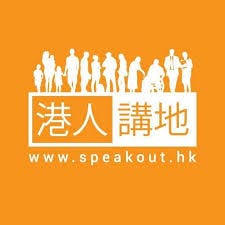
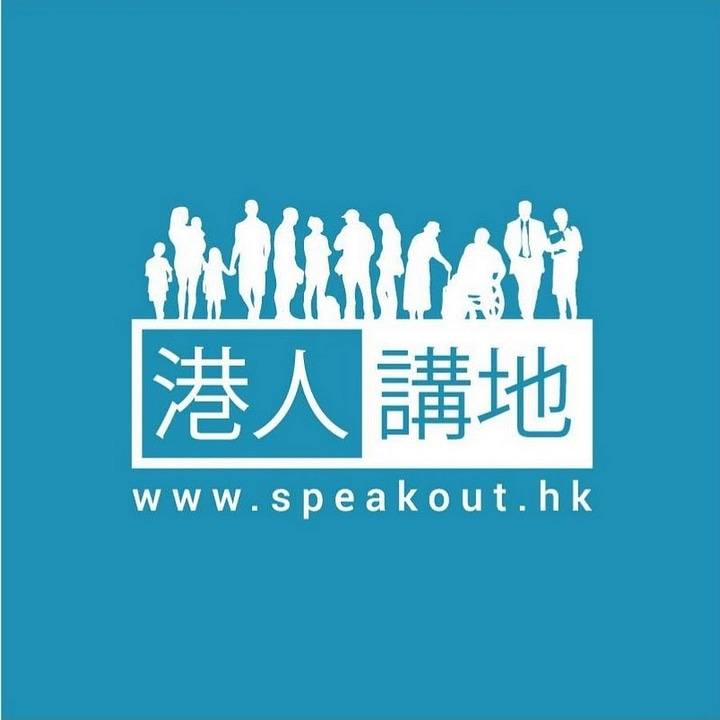
Looking at the content available on Speak Out HK, however, little has changed beyond the logo. Current leading stories include pieces blaming the National Endowment for Democracy for fomenting a “color revolution” in Hong Kong and supporting Taiwan independence, accusing Europe of starting a trade war by taxing Chinese EVs, and attacking a range of government critics including the son of Apple Daily owner Jimmy Lai, the Hong Kong Journalists Association, and activists-in-exile Nathan Law, Joey Siu, and Frances Hui.
Speak Out for Whom?
Despite this obvious editorial slant, Looop outlets are coy about their politics. Speak Out HK describes its mission purely in the form of platitudes about “encouraging rational discourse,” “seeking common ground,” and “gathering voices from all walks of life… to build a free, open, equal and mutually tolerant pluralistic society.” Studies, however, show that it is far more concerned with pushing the viewpoints of its owners than fostering open discussion. A 2019 survey from Hong Kong’s Lingnan University found that, throughout the 79-day pro-democracy Umbrella Movement in 2014, 94.4 percent of the articles published by Speak Out HK opposed the Movement or supported various anti-Movement endeavors. The vast majority of these (86.6 percent) were “soapbox”-style posts that offered opinions without starting a conversation or informing readers through original reporting or links to outside sources.
Over the years, Speak Out HK has been accused of putting politics before professionalism, altering photographs and videos to smear activist groups and target Leung’s perceived detractors. In 2014, for instance, they published articles undermining the University of Hong Kong’s well-regarded Public Opinion Programme (HKUPOP) after the group published survey results showing Leung had a low approval rating. When Leung was investigated for corruption over a series of undeclared payments from an Australian engineering firm during his time in office, Speak Out HK ran hundreds of articles defending Leung and attacking his detractors.
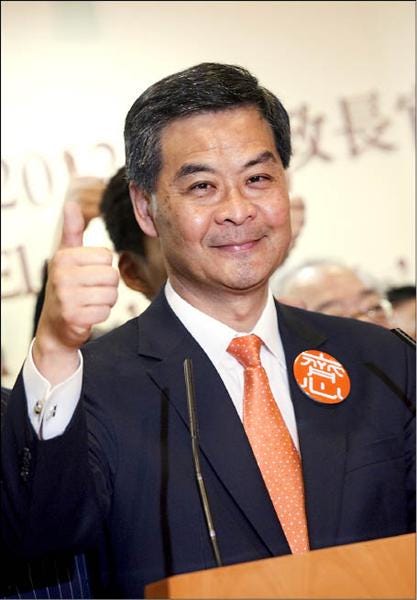
Behind the scenes, the Hong Kong United Foundation itself is slightly more forthcoming about its politics. The first of three “major areas of work” (三大領域工作) identified by the foundation is to “speak for Hong Kong” and to “tell China’s story well” (說好國家故事). The former is an example of the “silent majority” myth discussed above — the presumption by Leung and his allies that they are empowered to speak on behalf of the “silent majority” of pro-Beijing Hong Kong people. The latter, meanwhile, echoes Xi Jinping’s call in 2013 that the country’s media must “tell China’s story well” (講好中國的故事) — that is, to strengthen and innovate external propaganda, thereby enhancing China’s “international discourse power” (國際話語權) as a key aspect of its “comprehensive national power” (綜合國力).
Leung’s own words offer further insights. In a keynote speech marking HKUF’s anniversary in 2014, he said the group existed to “exterminate evil influences” in Hong Kong, referring to anti-government protesters and the foreign boogeymen Leung so often blames for his own unpopularity among the public.
Friends in High Places
While annual returns and other documents related to HKUF and Looop are available via Hong Kong’s Companies Registry, the sources of their income and where those sums are spent remain obscure. In its first year of operation, the overwhelming majority of HKUF’s income (HK$4,652,851.84) came from donations, with the remainder (HK$1,200,000) coming from “consultancy services.” These patterns persisted for years after HKUF’s founding, with hefty donations coming in from tycoons with close ties in China who reportedly saw support for the CE’s organization as a political “insurance policy.” Throughout Leung’s time as CE, HKUF also continued to make millions every year in “consulting” fees. In 2022, however, the organization suddenly received HK$0 in donations and instead reported HK$25,326,380.00 in “project fees.”
According to HKUF financial statements, Looop — HKUF’s only subsidiary — is responsible for “the “provision of project services.” However, while Looop accounts for all of HKUF’s financial liabilities, the only investment registered from HKUF to Looop is its HK$10,000 in share capital. No financial statements from Looop are available on the companies registry. While the HKUF complies with legal requirements, it does not operate with the same level transparency as many other NGOs and charitable groups, which often make annual disclosures.
While it’s unclear how exactly Looop Media survives as a media enterprise, it is easy to see that they enjoy many friends in high places. Consider the guestlist at the HKUF’s tenth-anniversary celebrations in 2022. In attendance were local CPPCC delegate Tam Yiu-chung; Deputy Secretary for Justice Horace Cheung; CPPCC National Committee Standing Committee member Tam Kam-kau; Secretary for Housing Winnie Ho; Deputy Secretary for Commerce and Economic Development Bureau Bernard Chan; and Deputy Secretary for Innovation, Technology and lndustry Lillian Cheong. Chief Executive John Lee also made an appearance via video address. At the ceremony, Leung Chun-ying bore witness as HKUF’s Mak Kwok Wah and Chan Ka Kui signed a partnership agreement with the National Radio and Television Administration (NRTA), an agency directly under the Central Propaganda Department, the official Guangzhou Broadcasting Network, and Guangdong provincial propaganda officials.
In his keynote speech at the event, Leung Chun-ying paid lip service to Xi Jinping’s concept of “Chinese-style modernization,” suggesting Hong Kong must help Xi attain his goal of making the PRC “trustworthy, lovable, and respected” on the world stage. Guangzhou Broadcasting Network’s representative Cui Songdong said in his speech that GBN and Looop “fought shoulder-to-shoulder on the streets” in 2019 against the pro-democracy protest movement, cooperated on “propaganda work” to support the national security law in 2020, and “told China’s story well” together in 2021 to mark the Chinese Communist Party’s centenary.
In the transforming Hong Kong media environment, Looop Media is something of a paradox. It is a site meant to look like a blog but is run by state media-trained propagandists, versed in Party-speak. Its outlets claim to “speak out” for the majority of Hongkongers but most residents put little stock in what it publishes. As many of Hong Kong’s most trusted and popular news outlets have been shut down or brought to heel in the national security crackdown, Looop has not only survived but thrived. The secret is simple: instead of appealing to the news-consuming public, they have won fans and patrons among the elite.


